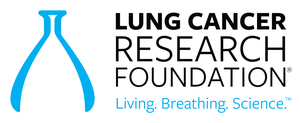NEW YORK, Feb. 23, 2021 /PRNewswire/ -- The Lung Cancer Research Foundation (LCRF) today announced a collaboration with AstraZeneca to fund over $900,000 in research grants focused on understanding resistance to epidermal growth factor receptor tyrosine kinase inhibitors (EGFR TKIs) and immune checkpoint inhibitors (ICIs), including therapeutic approaches to overcome these mechanisms, as well as biomarkers of immune-mediated adverse events.
Lung cancer is currently the number one cause of cancer death both in the U.S. and globally among both men and women. An estimated 625 new cases are diagnosed in the U.S. every day. As research funding grows, new treatments become available and survival rates improve. Promising new treatment options exist including targeted therapies and immunotherapies. Certain patients with non-small cell lung cancer (NSCLC) may benefit from targeted therapies which interfere with specific molecules involved in the growth and progression of cancer. For example, patients with EGFR mutation positive NSCLC can frequently benefit from treatment with EGFR tyrosine kinase inhibitors (TKIs). Despite clinical improvement with these therapies, acquired resistance invariably develops and insights into the mechanisms of resistance are needed as well as approaches to overcome and/or prevent resistance.
ICIs, which function by enhancing the body's immune response against cancer, have also led to profound improvements in the treatment of both locally advanced and metastatic NSCLC. Sustained clinical benefit of ICIs is not uniformly observed, however, and biological insights and biomarkers are needed to better guide patient selection to maximize their therapeutic benefit.
This collaboration seeks to support research studies that focus on understanding mechanisms of primary and acquired resistance to 3rd generation EGFR TKIs, and to identify more effective approaches to predict response and recurrence in patients treated with ICIs in locally advanced NSCLC. This collaboration will also promote advancing scientific knowledge in early stage and resectable NSCLC, including identification of predictive biomarkers of disease recurrence.
"LCRF is honored to continue its fifteen-year legacy of identifying and supporting outstanding lung cancer research projects over the years. We are excited to partner with AstraZeneca, who continues to be a generous supporter of our mission," said Katerina Politi, PhD, Chair, LCRF Scientific Advisory Board. "The specific focus of this grant program is to study treatment resistance and how that resistance may be overcome or prevented, addressing this very important issue that affects many lung cancer patients undergoing treatment."
To learn more about LCRF and its grants program, visit www.lcrf.org.
About the Lung Cancer Research Foundation (LCRF)
The Lung Cancer Research Foundation® (LCRF) is the leading nonprofit organization focused on funding innovative, high-reward research with the potential to extend survival and improve quality of life for people with lung cancer. LCRF's mission is to improve lung cancer outcomes by funding research for the prevention, diagnosis, treatment, and cure of lung cancer. To date, LCRF has funded 383 research grants, totaling nearly $36 million, the highest amount provided by a nonprofit organization dedicated to funding lung cancer research. For more information, visit lcrf.org.
Contact:
Sheila Sullivan
Sr. Director, Marketing & Communications, LCRF
[email protected]
SOURCE Lung Cancer Research Foundation

Related Links
WANT YOUR COMPANY'S NEWS FEATURED ON PRNEWSWIRE.COM?
Newsrooms &
Influencers
Digital Media
Outlets
Journalists
Opted In





Share this article